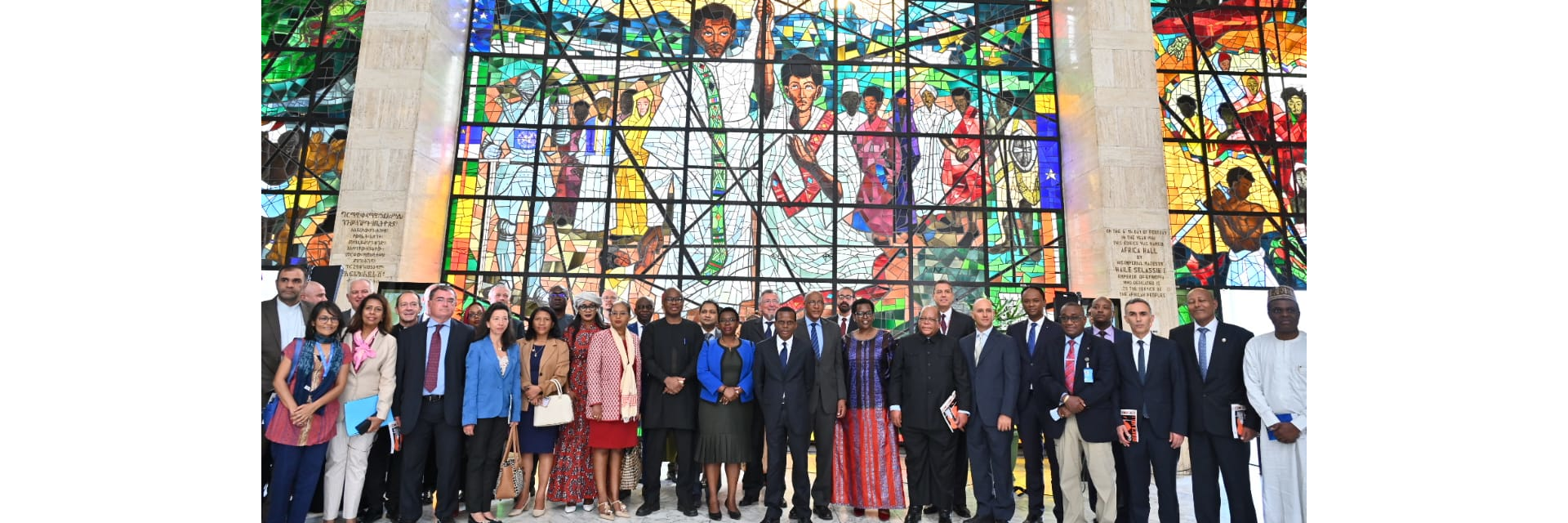Addis Ababa, 14 October 2022 (ECA) – Africa is rich in cultural heritage and it should leverage it for economic growth in a continent teeming with investment opportunities in trade and tourism.
Acting Executive Secretary of the United Nations Economic Commission for Africa (ECA), Antonio Pedro, speaking at the Groundbreaking Ceremony of the iconic Africa Hall Renovation Project, called on African countries to value their cultural heritage and promote it to spur economic growth.
Since its conception more than half a century ago, Africa Hall has been a truly living symbol of African history, unity and culture. It also represents one of the most prominent examples of African architectural heritage. The Hall, which is the first of a collection of twenty buildings making up the Economic Commission for Africa (ECA) Compound, was conceived and donated by the Emperor of Ethiopia Haile Selassie in the early 1960s. The initial vocation of the building was to create a paramount place for African art and culture.
Mr. Pedro, in paying tribute to the generosity by Ethiopia, said the Hall represents Africa’s past, present and future development trajectory as an opportunity for economic diversification.
“Today, the global value of international trade in the export of cultural goods stands at over US$ 18 trillion, '' said Mr. Pedro, adding that, “Cultural heritage remains one of the main reasons for travel to major destinations, thus boosting the tourism economy.”
Citing that leading tourist destination, France’s trade in the export of cultural goods is over US$11 billion, more than ten times that of all of Africa, at about US$725 million, Pedro said Africa was importing more cultural goods than it was exporting, despite its rich continental heritage.
“The modernization of the Africa Hall will preserve and restore the historical and cultural values embedded in its architecture, and also enable Africa to tap into the global creative industry, which is estimated to reach US$985 billion by 2025,” said Mr. Pedro, describing the groundbreaking ceremony for the Africa Hall as a new beginning for the continent.
In 2015, the UN General Assembly approved the budget of $57 million for the renovation project funded by the 193 member states. The renovations will “respect the original design principles including Afewek Tekle’s stained-glass triptych - 'The Total Liberation of Africa' - and main features with special attention paid to art works and signs, whilst upholding the best international standards and practice.” The Africa Hall will be opened in mid 2024.
The Africa Hall will also showcase great and notable works of pan-African artists, as well as serve as a hub for a variety of activities focused on showcasing Africa’s history, the achievements of the United Nations family and Ethiopia’s role in Africa’s modern history and culture.
During its lifetime, Africa Hall became a famous landmark venue for pan-African and African Renaissance events. It is the birthplace of the Organization of African Unity (OAU), which is now the African Union (AU), and whose founding Charter was signed in the Hall in 1963.
“We must make our history and culture, in other words heritage, work for our economic growth and diversification,” urged Pedro, calling for the addressing of several challenges such as the unavailability of adequate and reliable data which presented a major obstacle in formulating appropriate policies that could enhance the trade in cultural goods and bolster Africa’s economic growth and development.
Mr. Pedro said it was important for Africa to assert ownership of its culture and heritage, not only as a point of pride and a symbol of perseverance, but in the context of the continent’s economic growth and development, as informed by Agenda 2063 and the 2030 Agenda for Sustainable Development.
Deputy Chairperson of the African Union Commission, H.E. Dr. Monique Nsanzabaganwa, commended the renovation project, saying it was an important initiative to rejuvenate an important landmark of pan africanism and a symbol of continental renaissance.
Ms. Nsanzabaganwa, said lessons from the renovation of the Africa Hall will be used in the establishment of the envisaged Great African Museum to preserve and promote Africa’s rich cultural heritage.
The State Minister for Political and Economic Diplomacy of the Federal Democratic Republic of Ethiopia, H.E. Ambassador Tesfaye Yilma, affirming Ethiopia’s commitment to multilateralism, said Addis Ababa was privileged to host the ECA Headquarters which houses the Africa Hall as well as the Organization of African Unity, now the African Union.
“The symbolism of this building is significant as we prepare to celebrate the 60th year of the founding of the OAU in 2023. This is a time for Africa to reflect on how to manage complications that trace their origins back to colonialism. Africa is experiencing economic marginalization, political and security crisis and health emergencies,” Mr. Yilma said, noting that the iconic project should inspire current generations to overcome challenges as their predecessors did.
Africa is already witnessing the power of the creative sector. In 2015, the creative industries, comprising music, film, art and fashion, generated a total of US$ 4.8 billion for Nigeria with the country currently earning over US$ 11 billion and generating 4.2 million jobs, contributing about 2.3% of Nigeria's GDP.
Ends-
Issued by:
Communications Section
Economic Commission for Africa
PO Box 3001
Addis Ababa
Ethiopia
Tel: +251 11 551 5826
E-mail: eca-info@un.org
